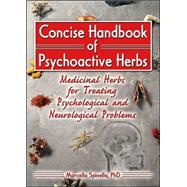
Note: Supplemental materials are not guaranteed with Rental or Used book purchases.
Purchase Benefits
Looking to rent a book? Rent Concise Handbook of Psychoactive Herbs: Medicinal Herbs for Treating Psychological and Neurological Problems [ISBN: 9780789018588] for the semester, quarter, and short term or search our site for other textbooks by Spinella; Marcello. Renting a textbook can save you up to 90% from the cost of buying.
| Chapter 1. Introduction | 1 | (14) | |||
|
1 | (3) | |||
|
4 | (5) | |||
|
9 | (1) | |||
|
9 | (1) | |||
|
10 | (3) | |||
|
13 | (2) | |||
| Chapter 2. How the Brain Works | 15 | (14) | |||
|
15 | (4) | |||
|
19 | (5) | |||
|
24 | (5) | |||
| Chapter 3. How Drugs Work | 29 | (10) | |||
|
29 | (4) | |||
|
33 | (2) | |||
|
35 | (4) | |||
| Chapter 4. Stimulant Herbs | 39 | (30) | |||
|
39 | (2) | |||
|
41 | (9) | |||
|
50 | (8) | |||
|
58 | (10) | |||
|
68 | (1) | |||
| Chapter 5. Cognition-Enhancing Herbs | 69 | (22) | |||
|
69 | (4) | |||
|
73 | (5) | |||
|
78 | (3) | |||
|
81 | (2) | |||
|
83 | (1) | |||
|
84 | (3) | |||
|
87 | (2) | |||
|
89 | (2) | |||
| Chapter 6. Sedative and Anti-Anxiety Herbs | 91 | (20) | |||
|
91 | (1) | |||
|
92 | (1) | |||
|
93 | (1) | |||
|
94 | (3) | |||
|
97 | (3) | |||
|
100 | (5) | |||
|
105 | (2) | |||
|
107 | (1) | |||
|
108 | (1) | |||
|
109 | (2) | |||
| Chapter 7. Herbs for Mental Illnesses | 111 | (18) | |||
|
111 | (2) | |||
|
113 | (3) | |||
|
116 | (4) | |||
|
120 | (3) | |||
|
123 | (2) | |||
|
125 | (4) | |||
| Chapter 8. Herbal Painkillers | 129 | (30) | |||
|
129 | (1) | |||
|
130 | (2) | |||
|
132 | (1) | |||
|
133 | (2) | |||
|
135 | (6) | |||
|
141 | (1) | |||
|
142 | (3) | |||
|
145 | (1) | |||
|
145 | (2) | |||
|
147 | (1) | |||
|
148 | (3) | |||
|
151 | (3) | |||
|
154 | (5) | |||
| Chapter 9. Herbal Hallucinogens | 159 | (24) | |||
|
159 | (2) | |||
|
161 | (1) | |||
|
162 | (13) | |||
|
175 | (2) | |||
|
177 | (4) | |||
|
181 | (2) | |||
| Chapter 10. Cannabis | 183 | (16) | |||
|
183 | (2) | |||
|
185 | (8) | |||
|
193 | (1) | |||
|
194 | (3) | |||
|
197 | (2) | |||
| Chapter 11. Use, Abuse, and Addiction | 199 | (22) | |||
|
200 | (4) | |||
|
204 | (1) | |||
|
205 | (4) | |||
|
209 | (3) | |||
|
212 | (1) | |||
|
213 | (2) | |||
|
215 | (3) | |||
|
218 | (1) | |||
|
219 | (2) | |||
| Glossary | 221 | (18) | |||
| Bibliography | 239 | (32) | |||
| Index | 271 |
The New copy of this book will include any supplemental materials advertised. Please check the title of the book to determine if it should include any access cards, study guides, lab manuals, CDs, etc.
The Used, Rental and eBook copies of this book are not guaranteed to include any supplemental materials. Typically, only the book itself is included. This is true even if the title states it includes any access cards, study guides, lab manuals, CDs, etc.